- Home
- Albert Camus
PREFACE Page 5
PREFACE Read online
Page 5
Only at the end of this difficult path does the absurd man recognize his true motives. Upon comparing his inner exigence and what is then offered him, he suddenly feels he is going to turn away. In the universe of Husserl the world becomes clear and that longing for familiarity that man's heart harbors becomes useless. In Kierkegaard's apocalypse that desire for clarity must be given up if it wants to be satisfied. Sin is not so much knowing (if it were, everybody would be innocent) as wanting to know. Indeed, it is the only sin of which the absurd man can feel that it constitutes both his guilt and his innocence. He is offered a solution in which all the past contradictions have become merely polemical games. But this is not the way he experienced them. Their truth must be preserved, which consists in not being satisfied. He does not want preaching.
My reasoning wants to be faithful to the evidence that aroused it. That evidence is the absurd. It is that divorce between the mind that desires and the world that disappoints, my nostalgia for unity, this fragmented universe and the contradiction that binds them together. Kierkegaard suppresses my nostalgia and Husserl gathers together that universe. That is not what I was expecting. It was a matter of living and thinking with those dislocations, of knowing whether one had to accept or refuse. There can be no question of masking the evidence, of suppressing the absurd by denying one of the terms of its equation. It is essential to know whether one can live with it or whether, on the other hand, logic commands one to die of it. I am not interested in philosophical suicide, but rather in plain suicide. I merely wish to purge it of its emotional content and know its logic and its integrity. Any other position implies for the absurd mind deceit and the mind's retreat before what the mind itself has brought to light. Husserl claims to obey the desire to escape "the inveterate habit of living and thinking in certain well-known and convenient conditions of existence," but the final leap restores in him the eternal and its comfort. The leap does not represent an extreme danger as Kierkegaard would like it to do. The danger, on the contrary, lies in the subtle instant that precedes the leap. Being able to remain on that dizzying crest—that is integrity and the rest is subterfuge. I know also that never has helplessness inspired such striking harmonies as those of Kierkegaard. But if helplessness has its place in the indifferent landscapes of history, it has none in a reasoning whose exigence is now known.
Absurd Freedom
Now the main thing is done, I hold certain facts from which I cannot separate. What I know, what is certain, what I cannot deny, what I cannot reject—this is what counts. I can negate everything of that part of me that lives on vague nostalgias, except this desire for unity, this longing to solve, this need for clarity and cohesion. I can refute everything in this world surrounding me that offends or enraptures me, except this chaos, this sovereign chance and this divine equivalence which springs from anarchy. I don't know whether this world has a meaning that transcends it. But I know that I do not know that meaning and that it is impossible for me just now to know it. What can a meaning outside my condition mean to me? I can understand only in human terms. What I touch, what resists me—that is what I understand. And these two certainties—my appetite for the absolute and for unity and the impossibility of reducing this world to a rational and reasonable principle —I also know that I cannot reconcile them. What other truth can I admit without lying, without bringing in a hope I lack and which means nothing within the limits of my condition?
If I were a tree among trees, a cat among animals, this life would have a meaning, or rather this problem would not arise, for I should belong to this world. I should be this world to which I am now opposed by my whole consciousness and my whole insistence upon familiarity. This ridiculous reason is what sets me in opposition to all creation. I cannot cross it out with a stroke of the pen. What I believe to be true I must therefore preserve. What seems to me so obvious, even against me, I must support. And what constitutes the basis of that conflict, of that break between the world and my mind, but the awareness of it? If therefore I want to preserve it, I can through a constant awareness, ever revived, ever alert. This is what, for the moment, I must remember. At this moment the absurd, so obvious and yet so hard to win, returns to a man's life and finds its home there. At this moment, too, the mind can leave the arid, dried-up path of lucid effort. That path now emerges in daily life. It encounters the world of the anonymous impersonal pronoun "one," but henceforth man enters in with his revolt and his lucidity. He has forgotten how to hope. This hell of the present is his Kingdom at last. All problems recover their sharp edge. Abstract evidence retreats before the poetry of forms and colors. Spiritual conflicts become embodied and return to the abject and magnificent shelter of man's heart. None of them is settled. But all are transfigured. Is one going to die, escape by the leap, rebuild a mansion of ideas and forms to one's own scale? Is one, on the contrary, going to take up the heart-rending and marvelous wager of the absurd? Let's make a final effort in this regard and draw all our conclusions. The body, affection, creation, action, human nobility will then resume their places in this mad world. At last man will again find there the wine of the absurd and the bread of indifference on which he feeds his greatness.
Let us insist again on the method: it is a matter of persisting. At a certain point on his path the absurd man is tempted. History is not lacking in either religions or prophets, even without gods. He is asked to leap. All he can reply is that he doesn't fully understand, that it is not obvious. Indeed, he does not want to do anything but what he fully understands. He is assured that this is the sin of pride, but he does not understand the notion of sin; that perhaps hell is in store, but he has not enough imagination to visualize that strange future; that he is losing immortal life, but that seems to him an idle consideration. An attempt is made to get him to admit his guilt. He feels innocent. To tell the truth, that is all he feels—his irreparable innocence. This is what allows him everything. Hence, what he demands of himself is to live solely with what he knows, to accommodate himself to what is, and to bring in nothing that is not certain. He is told that nothing is. But this at least is a certainty. And it is with this that he is concerned: he wants to find out if it is possible to live without appeal.
* * *
Now I can broach the notion of suicide. It has already been felt what solution might be given. At this point the problem is reversed. It was previously a question of finding out whether or not life had to have a meaning to be lived. It now becomes clear, on the contrary, that it will be lived all the better if it has no meaning. Living an experience, a particular fate, is accepting it fully. Now, no one will live this fate, knowing it to be absurd, unless he does everything to keep before him that absurd brought to light by consciousness. Negating one of the terms of the opposition on which he lives amounts to escaping it. To abolish conscious revolt is to elude the problem. The theme of permanent revolution is thus carried into individual experience. Living is keeping the absurd alive. Keeping it alive is, above all, contemplating it. Unlike Eurydice, the absurd dies only when we turn away from it. One of the only coherent philosophical positions is thus revolt. It is a constant confrontation between man and his own obscurity. It is an insistence upon an impossible transparency. It challenges the world anew every second. Just as danger provided man the unique opportunity of seizing awareness, so metaphysical revolt extends awareness to the whole of experience. It is that constant presence of man in his own eyes. It is not aspiration, for it is devoid of hope. That revolt is the certainty of a crushing fate, without the resignation that ought to accompany it.
This is where it is seen to what a degree absurd experience is remote from suicide. It may be thought that suicide follows revolt—but wrongly. For it does not represent the logical outcome of revolt. It is just the contrary by the consent it presupposes. Suicide, like the leap, is acceptance at its extreme. Everything is over and man returns to his essential history. His future, his unique and dreadful future—he sees and rushes toward it. In its way, suicide settles the a
bsurd. It engulfs the absurd in the same death. But I know that in order to keep alive, the absurd cannot be settled. It escapes suicide to the extent that it is simultaneously awareness and rejection of death. It is, at the extreme limit of the condemned man's last thought, that shoelace that despite everything he sees a few yards away, on the very brink of his dizzying fall. The contrary of suicide, in fact, is the man condemned to death.
That revolt gives life its value. Spread out over the whole length of a life, it restores its majesty to that life. To a man devoid of blinders, there is no finer sight than that of the intelligence at grips with a reality that transcends it. The sight of human pride is unequaled. No disparagement is of any use. That discipline that the mind imposes on itself, that will conjured up out of nothing, that face-to-face struggle have something exceptional about them. To impoverish that reality whose inhumanity constitutes man's majesty is tantamount to impoverishing him himself. I understand then why the doctrines that explain everything to me also debilitate me at the same time. They relieve me of the weight of my own life, and yet I must carry it alone. At this juncture, I cannot conceive that a skeptical metaphysics can be joined to an ethics of renunciation.
Consciousness and revolt, these rejections are the contrary of renunciation. Everything that is indomitable and passionate in a human heart quickens them, on the contrary, with its own life. It is essential to die unreconciled and not of one's own free will. Suicide is a repudiation. The absurd man can only drain everything to the bitter end, and deplete himself. The absurd is his extreme tension, which he maintains constantly by solitary effort, for he knows that in that consciousness and in that day-to-day revolt he gives proof of his only truth, which is defiance. This is a first consequence.
* * *
If I remain in that prearranged position which consists in drawing all the conclusions (and nothing else) involved in a newly discovered notion, I am faced with a second paradox. In order to remain faithful to that method, I have nothing to do with the problem of metaphysical liberty. Knowing whether or not man is free doesn't interest me. I can experience only my own freedom. As to it, I can have no general notions, but merely a few clear insights. The problem of "freedom as such" has no meaning. For it is linked in quite a different way with the problem of God. Knowing whether or not man is free involves knowing whether he can have a master. The absurdity peculiar to this problem comes from the fact that the very notion that makes the problem of freedom possible also takes away all its meaning. For in the presence of God there is less a problem of freedom than a problem of evil. You know the alternative: either we are not free and God the all-powerful is responsible for evil. Or we are free and responsible but God is not all-powerful. All the scholastic subtleties have neither added anything to nor subtracted anything from the acuteness of this paradox.
This is why I cannot get lost in the glorification or the mere definition of a notion which eludes me and loses its meaning as soon as it goes beyond the frame of reference of my individual experience. I cannot understand what kind of freedom would be given me by a higher being. I have lost the sense of hierarchy. The only conception of freedom I can have is that of the prisoner or the individual in the midst of the State. The only one I know is freedom of thought and action. Now if the absurd cancels all my chances of eternal freedom, it restores and magnifies, on the other hand, my freedom of action. That privation of hope and future means an increase in man's availability.
Before encountering the absurd, the everyday man lives with aims, a concern for the future or for justification (with regard to whom or what is not the question). He weighs his chances, he counts on "someday," his retirement or the labor of his sons. He still thinks that something in his life can be directed. In truth, he acts as if he were free, even if all the facts make a point of contradicting that liberty. But after the absurd, everything is upset. That idea that "I am," my way of acting as if everything has a meaning (even if, on occasion, I said that nothing has)—all that is given the lie in vertiginous fashion by the absurdity of a possible death. Thinking of the future, establishing aims for oneself, having preferences—all this presupposes a belief in freedom, even if one occasionally ascertains that one doesn't feel it. But at that moment I am well aware that that higher liberty, that freedom to be, which alone can serve as basis for a truth, does not exist. Death is there as the only reality. After death the chips are down. I am not even free, either, to perpetuate myself, but a slave, and, above all, a slave without hope of an eternal revolution, without recourse to contempt. And who without revolution and without contempt can remain a slave? What freedom can exist in the fullest sense without assurance of eternity?
But at the same time the absurd man realizes that hitherto he was bound to that postulate of freedom on the illusion of which he was living. In a certain sense, that hampered him. To the extent to which he imagined a purpose to his life, he adapted himself to the demands of a purpose to be achieved and became the slave of his liberty. Thus I could not act otherwise than as the father (or the engineer or the leader of a nation, or the post-office sub-clerk) that I am preparing to be. I think I can choose to be that rather than something else. I think so unconsciously, to be sure. But at the same time I strengthen my postulate with the beliefs of those around me, with the presumptions of my human environment (others are so sure of being free, and that cheerful mood is so contagious!). However far one may remain from any presumption, moral or social, one is partly influenced by them and even, for the best among them (there are good and bad presumptions), one adapts one's life to them. Thus the absurd man realizes that he was not really free. To speak clearly, to the extent to which I hope, to which I worry about a truth that might be individual to me, about a way of being or creating, to the extent to which I arrange my life and prove thereby that I accept its having a meaning, I create for myself barriers between which I confine my life. I do like so many bureaucrats of the mind and heart who only fill me with disgust and whose only vice, I now see clearly, is to take man's freedom seriously.
The absurd enlightens me on this point: there is no future. Henceforth this is the reason for my inner freedom. I shall use two comparisons here. Mystics, to begin with, find freedom in giving themselves. By losing themselves in their god, by accepting his rules, they become secretly free. In spontaneously accepted slavery they recover a deeper independence. But what does that freedom mean? It may be said, above all, that they feel free with regard to themselves, and not so much free as liberated. Likewise, completely turned toward death (taken here as the most obvious absurdity), the absurd man feels released from everything outside that passionate attention crystallizing in him. He enjoys a freedom with regard to common rules. It can be seen at this point that the initial themes of existential philosophy keep their entire value. The return to consciousness, the escape from everyday sleep represent the first steps of absurd freedom. But it is existential preaching that is alluded to, and with it that spiritual leap which basically escapes consciousness. In the same way (this is my second comparison) the slaves of antiquity did not belong to themselves. But they knew that freedom which consists in not feeling responsible.2 Death, too, has patrician hands which, while crushing, also liberate.
Losing oneself in that bottomless certainty, feeling henceforth sufficiently remote from one's own life to increase it and take a broad view of it—this involves the principle of a liberation. Such new independence has a definite time limit, like any freedom of action. It does not write a check on eternity. But it takes the place of the illusions of freedom, which all stopped with death. The divine availability of the condemned man before whom the prison doors open in a certain early dawn, that unbelievable disinterestedness with regard to everything except for the pure flame of life—it is clear that death and the absurd are here the principles of the only reasonable freedom: that which a human heart can experience and live. This is a second consequence. The absurd man thus catches sight of a burning and frigid, transparent and limited universe in
which nothing is possible but everything is given, and beyond which all is collapse and nothingness. He can then decide to accept such a universe and draw from it his strength, his refusal to hope, and the unyielding evidence of a life without consolation.
* * *
But what does life mean in such a universe? Nothing else for the moment but indifference to the future and a desire to use up everything that is given. Belief in the meaning of life always implies a scale of values, a choice, our preferences. Belief in the absurd, according to our definitions, teaches the contrary. But this is worth examining.
Knowing whether or not one can live without appeal is all that interests me. I do not want to get out of my depth. This aspect of life being given me, can I adapt myself to it? Now, faced with this particular concern, belief in the absurd is tantamount to substituting the quantity of experiences for the quality. If I convince myself that this life has no other aspect than that of the absurd, if I feel that its whole equilibrium depends on that perpetual opposition between my conscious revolt and the darkness in which it struggles, if I admit that my freedom has no meaning except in relation to its limited fate, then I must say that what counts is not the best living but the most living. It is not up to me to wonder if this is vulgar or revolting, elegant or deplorable. Once and for all, value judgments are discarded here in favor of factual judgments. I have merely to draw the conclusions from what I can see and to risk nothing that is hypothetical. Supposing that living in this way were not honorable, then true propriety would command me to be dishonorable.

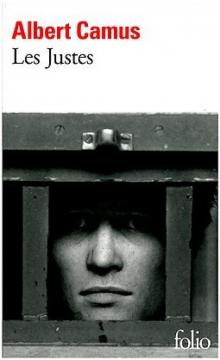 Les Justes
Les Justes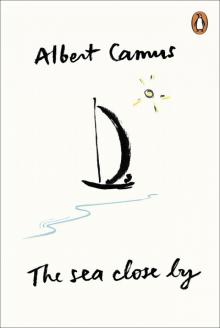 The Sea Close By
The Sea Close By The Stranger
The Stranger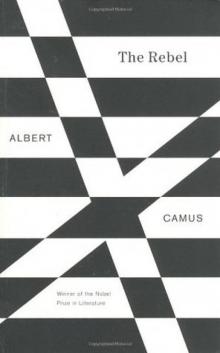 The Rebel: An Essay on Man in Revolt
The Rebel: An Essay on Man in Revolt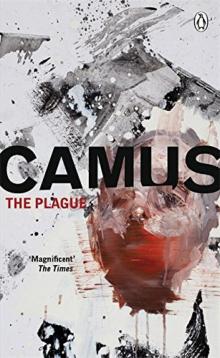 The plague
The plague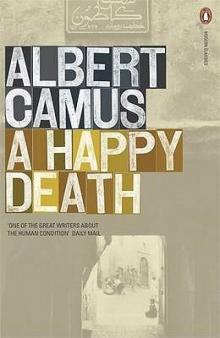 A Happy Death
A Happy Death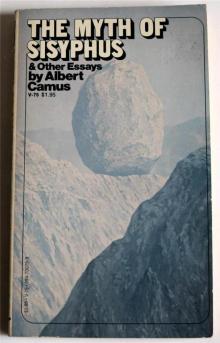 The Myth of Sisyphus and Other Essays
The Myth of Sisyphus and Other Essays The Fall
The Fall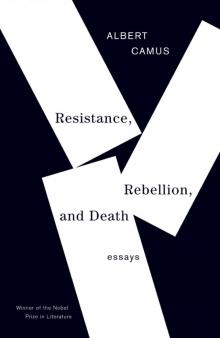 Resistance, Rebellion, and Death
Resistance, Rebellion, and Death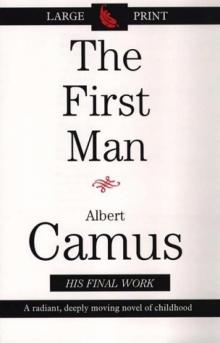 The First Man
The First Man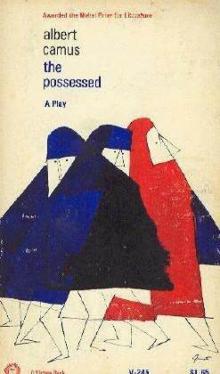 The Possessed
The Possessed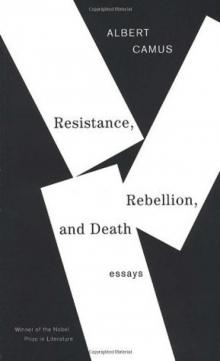 Resistance, Rebellion and Death: Essays
Resistance, Rebellion and Death: Essays